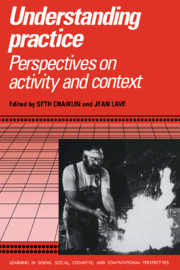Series foreword
Published online by Cambridge University Press: 06 January 2010
Summary
The situated nature of learning, remembering, and understanding is a central fact. It may appear obvious that human minds develop in social situations, and that they use the tools and representational media that culture provides to support, extend, and reorganize mental functioning. But cognitive theories of knowledge representation and educational practice, in school and in the workplace, have not been sufficiently responsive to questions about these relationships. And the need for responsiveness has become salient as computational media radically reshape the frontiers of individual and social action, and as educational achievement fails to translate into effective use of knowledge.
This series is born of the conviction that new and exciting interdisciplinary syntheses are under way, as scholars and practitioners from diverse fields seek to analyze and influence the new transformations of social and mental life, and to understand successful learning wherever it occurs.
Computational media include not only computers but the vast array of expressive, receptive, and presentational devices available for use with computers, including interactive video, optical media such as CD-ROM and CD-I, networks, hypermedia systems, workgroup collaboration tools, speech recognition and synthesis, image processing and animation, and software more generally.
These technologies are dramatically transforming the basic patterns of communication and knowledge interchange in societies, and automating the component processes of thinking and problem solving. In changing situations of knowledge acquisition and use, the new interactive technologies redefine-in ways yet to be determined-what it means to know and understand, and what it means to become “literate” or an “educated citizen.”
The series invites contributions that advance our understanding of these seminal issues.
- Type
- Chapter
- Information
- Understanding PracticePerspectives on Activity and Context, pp. vii - viiiPublisher: Cambridge University PressPrint publication year: 1993



